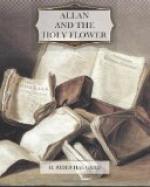Another man whom I did not send for, but who came, was an old Hottentot named Hans, with whom I had been more or less mixed up all my life. When I was a boy he was my father’s servant in the Cape Colony and my companion in some of those early wars. Also he shared some very terrible adventures with me which I have detailed in the history I have written of my first wife, Marie Marais. For instance, he and I were the only persons who escaped from the massacre of Retief and his companions by the Zulu king, Dingaan. In the subsequence campaigns, including the Battle of the Blood River, he fought at my side and ultimately received a good share of captured cattle. After this he retired and set up a native store at a place called Pinetown, about fifteen miles out of Durban. Here I am afraid he got into bad ways and took to drink more or less; also to gambling. At any rate, he lost most of his property, so much of it indeed that he scarcely knew which way to turn. Thus it happened that one evening when I went out of the house where I had been making up my accounts, I saw a yellow-faced white-haired old fellow squatted on the verandah smoking a pipe made out of a corn-cob.
“Good day, Baas,” he said, “here am I, Hans.”
“So I see,” I answered, rather coldly. “And what are you doing here, Hans? How can you spare time from your drinking and gambling at Pinetown to visit me here, Hans, after I have not seen you for three years?”
“Baas, the gambling is finished, because I have nothing more to stake, and the drinking is done too, because but one bottle of Cape Smoke makes me feel quite ill next morning. So now I only take water and as little of that as I can, water and some tobacco to cover up its taste.”
“I am glad to hear it, Hans. If my father, the Predikant who baptised you, were alive now, he would have much to say about your conduct as indeed I have no doubt he will presently when you have gone into a hole (i.e., a grave). For there in the hole he will be waiting for you, Hans.”
“I know, I know, Baas. I have been thinking of that and it troubles me. Your reverend father, the Predikant, will be very cross indeed with me when I join him in the Place of Fires where he sits awaiting me. So I wish to make my peace with him by dying well, and in your service, Baas. I hear that the Baas is going on an expedition. I have come to accompany the Baas.”




